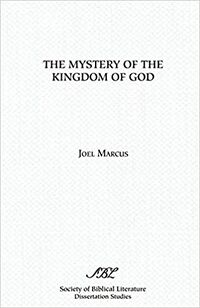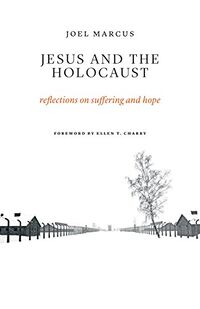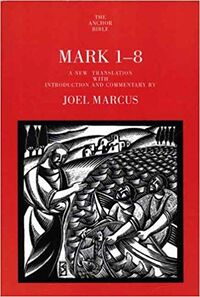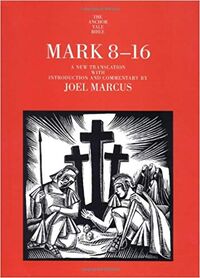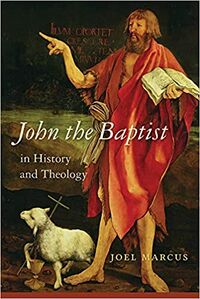Joel Marcus (M / United States, 1951), scholar
Jump to navigation
Jump to search
Joel Marcus (b.1951) is an American scholar. PhD (1985) at Columbia University-Union Theological Seminary. Professor of New Testament and Christian Origins at Duke University.
1980s
Joel Marcus, The Mystery of the Kingdom of God (Atlanta, GA: Scholars Press, 1986)
- A study of Mark 4:1-34. Originally presented as the author's thesis (PhD--Columbia University, 1985)
1990s
Joel Markus, Jesus and the Holocaust: Reflections on Suffering and Hope (New York, Doubleday, 1997)
- "Jesus was a Jew. Yet nineteen centuries after his death, hatred inspired in part by the long-standing tradition of Christian anti-Judaism played a significant role in the murder of six million Jews in the Holocaust ... How are Christians and Jews to deal with this jarring historical incongruity? ... In Jesus and the Holocaust Joel Marcus—a Jew by birth, a Christian by choice—offers stirring meditations on the relationship between the deaths of six million Jews at the hands of the Nazis and the death of one innocent Jew on the cross. Basing his work on sermons he originally preached on Good Friday 1995, a date that also corresponded with the fifty-year anniversary of the end of the Holocaust, Marcus weaves reflection on Bible passages together with poetry and narratives about the Holocaust. He shows how the hope that Christians have always found hidden in Christ's darkest hour can shed light on one of the most tragic events of our recent history—and vice versa."--Publisher description.
2000s
Joel Marcus, Mark 1-8 (Anchor Bible, 27; New York, NY: Doubleday, 2000)
- Part One of a two-volume commentary on the Gospel of Mark. Followed by Mark 8-16 ~ Anchor Bible (2009 Marcus), book.
- "Although it appears second in the New Testament, Mark is generally recognized as the first Gospel to be written. Captivating nonstop narrative characterizes this earliest account of the life and teachings of Jesus. In the first installment of his two-volume commentary on Mark, New Testament scholar Joel Marcus recaptures the power of Mark's enigmatic narrative and capitalizes on its lively pace to lead readers through familiar and not-so-familiar episodes from the ministry of Jesus. As Marcus points out, the Gospel of Mark can be understood only against the backdrop of the apocalyptic atmosphere of the Jewish rebellions of 66-73 c.e., during which the Roman army destroyed the Temple of Jerusalem (70 c.e.). While the Jewish revolutionaries believed that the war was "the beginning of the end" and that a messianic redeemer would soon appear to lead his people to victory over their human enemies (the Romans) and cosmic foes (the demons), for Mark the redeemer had already come in the person of Jesus. Paradoxically, however, Jesus had won the decisive holy-war victory when he was rejected by his own people and executed on a Roman cross. The student of two of this generation's most respected Bible scholars and Anchor Bible authors, Raymond E. Brown and J. Louis Martyn, Marcus helps readers understand the history, social customs, economic realities, religious movements, and spiritual and personal circumstances that made Jesus who he was. The result is a Bible commentary of the quality and originality readers have come to expect of the renowned Anchor Bible series. Challenging to scholars and enlightening to laypeople, "Mark 1-8" is an invaluable tool for anyone reading the Gospelstory."--Publisher description.
Joel Marcus, Mark 8-16 (Anchor Yale Bible, 27A; New Haven, CT: Yale University Press, 2009)
- Part Two of a two-volume commentary on the Gospel of Mark. Preceded by Mark 1-8 ~ Anchor Bible (2000 Marcus), book.
- "In the final nine chapters of the Gospel of Mark, Jesus increasingly struggles with his disciples' incomprehension of his unique concept of suffering messiahship and with the opposition of the religious leaders of his day. The Gospel recounts the events that led to Jesus' arrest, trial, and crucifixion by the Roman authorities, concluding with an enigmatic ending in which Jesus' resurrection is announced but not displayed. In this volume New Testament scholar Joel Marcus offers a new translation of Mark 8-16 as well as extensive commentary and notes. He situates the narrative within the context of first-century Palestine and the larger Greco-Roman world; within the political context of the Jewish revolt against the Romans (66-73 C.E.); and within the religious context of the early church's sometimes rancorous engagement with Judaism, pagan religion, and its own internal problems. For religious scholars, pastors, and interested lay people alike, the book provides an accessible and enlightening window on the second of the canonical Gospels."--Publisher description.
2010s
Joel Marcus, John the Baptist in History and Theology (Columbia, SC: University of South Carolina Press, 2018)
- "While the Christian tradition has subordinated John the Baptist to Jesus of Nazareth, John himself would likely have disagreed with that ranking. In this eye-opening new book, John the Baptist in History and Theology, Joel Marcus makes a powerful case that John saw himself, not Jesus, as the proclaimer and initiator of the kingdom of God and his own ministry as the center of God's saving action in history ... Although the Fourth Gospel has the Baptist saying, "He must increase, but I must decrease," Marcus contends that this and other biblical and extrabiblical evidence reveal a continuing competition between the two men that early Christians sought to muffle. Like Jesus, John was an apocalyptic prophet who looked forward to the imminent end of the world and the establishment of God's rule on earth. Originally a member of the Dead Sea Sect, an apocalyptic community within Judaism, John broke with the group over his growing conviction that he himself was Elijah, the end-time prophet who would inaugurate God's kingdom on earth. Through his ministry of baptism, he ushered all who came to him―Jews and non-Jews alike―into this dawning new age. Jesus began his career as a follower of the Baptist, but, like other successor figures in religious history, he parted ways from his predecessor as he became convinced of his own centrality in God's purposes. Meanwhile John's mass following and apocalyptic message became political threats to Herod Antipas, who had John executed to abort any revolutionary movement ... Based on close critical-historical readings of early texts―including the accounts of John in the Gospels and in Josephus's Antiquities―as well as parallels from later religious movements, John the Baptist in History and Theology situates the Baptist within Second Temple Judaism and compares him to other apocalyptic thinkers from ancient and modern times. It concludes with thoughtful reflections on how its revisionist interpretations might be incorporated into the Christian faith."--Publisher description.
- Contents : Introduction -- The Competition Hypothesis -- Qumran -- The Elijah Role -- Baptism -- Jesus -- Herod Antipas --Conclusion -- Appendix 1. The Chronology of John's Life -- Appendix 2. Is Josephus's Account of John the Baptist a Christian Interpolation? -- Appendix 3. Database by Source of Information about John the Baptist in the Canonical Gospels and Josephus -- Appendix 4. Was John from a Priestly Background? -- Appendix 5. The "Others" in Josephus, Antiquities 18.118 -- Appendix 6. Knut Backhaus's Interpretation of Acts 19:1-7 -- Appendix 7. The "Day-Baptists" -- Appendix 8. John the Baptist's Use of Isaiah 40:3 -- Appendix 9. The Baptist in the Slavonic Version of Josephus's Jewish War -- Appendix 10. Apocalyptic Belief and Perfectionism -- Appendix 11. The Meaning of "Purification" in John 3:25.
- Reviews : Steve M. Bryan, Journal of the Evangelical Theological Society 63.2 (2020) 374-378. -- Iranzu Galdeano, Estudios bíblicos 78.2 (2020) 367-370. -- Nathan L. Shedd, Religious Studies Review 46.2 (2020) 229. -- Ian C. Werrett, Catholic Biblical Quarterly 82.2 (2020) 326-328.

